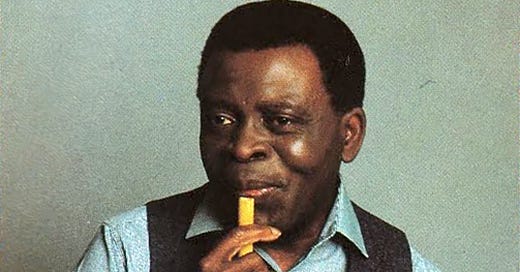Few people can claim a successful career as an author, poet, radio presenter, international civil servant, journalist and music revolutionary. Francis Bebey can and it all began studying maths.
Born in Cameroon in 1929 he moved to New York after his maths degree. He wasn’t there long and returned to west Africa, personally invited by Ghana’s revolutionary president. It wasn’t until his move to France in the 60s that he really got going though.
In France, he presented a radio station, worked as a journalist and began publishing poetry. In 1969 he released his first album and he went on to release 20 more. He fused Cameroonian sounds with western jazz, pop and classical and his lyrics alternated between three languages. Most impressively, he was the first African musician to put synthesised instruments at the centre of his music. “What I’m aiming to do,” he said, “is use Western technology to invigorate African music and spread its message internationally.”
He was a complete polymath. His novels were acclaimed and his first won the Grand prix littéraire d'Afrique noire while his second won the Prize Saint Exupéry. Some of his songs were based on these demonstrating the breadth of Bebey’s creativity.
Bebey’s fascination with African music never wavered. While working as a journalist he heard of a single note flute played by the indigenous people of the Congo Basin. He went to learn about it, them and their music in person, immersing himself in their culture. The flute, or n'dehou, is what’s heard in this week’s song.
The passage from his book on African music, African Music: A People’s Art, published in 1969, gives a flavour of his remarkable multidisciplinary abilities:
“Welding and regeneration will be the pattern for African art. Many of the foreign influences that have penetrated Africa will be incorporated into a new form of black African art. This form of initiation may be deplored by those with deep-seated conservative or racist tendencies, but far from resulting in a bastardised and damaging modernism, we believe this mutation will breathe new life into African art and will demonstrate the triumph of humanism and universality over esoteric sterility….It is imperative that the future of African music be based on the idea of development and not merely upon preservation.”1
Check out the remarkable Coffee Cola Song below.
https://thevinylfactory.com/features/electric-futurism-francis-bebey/




